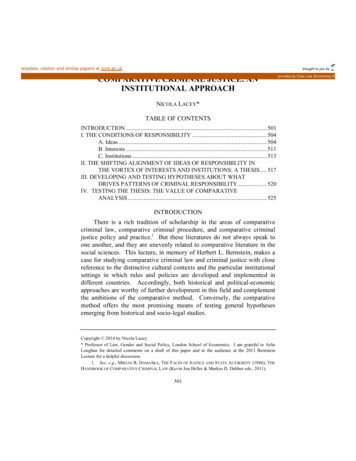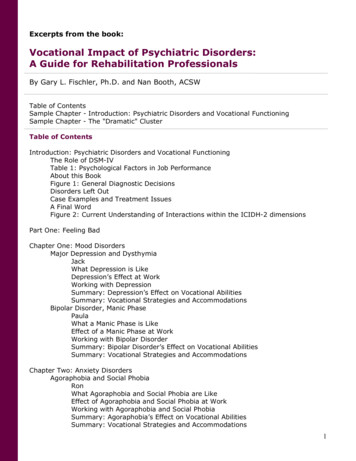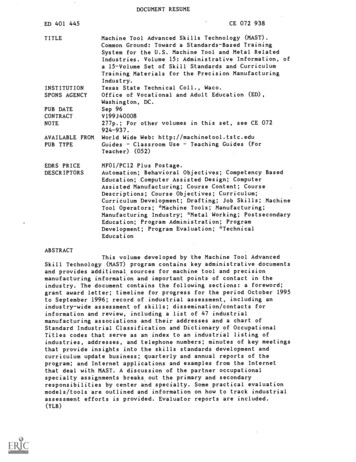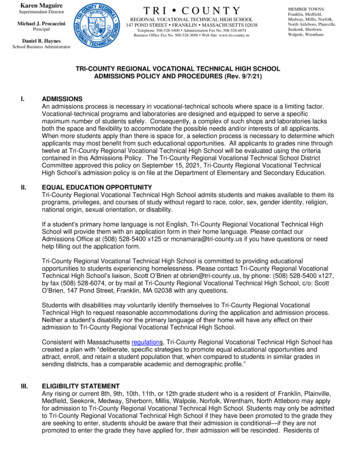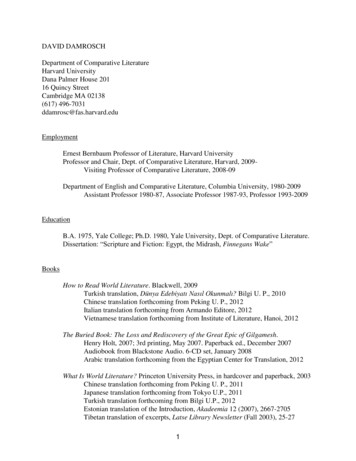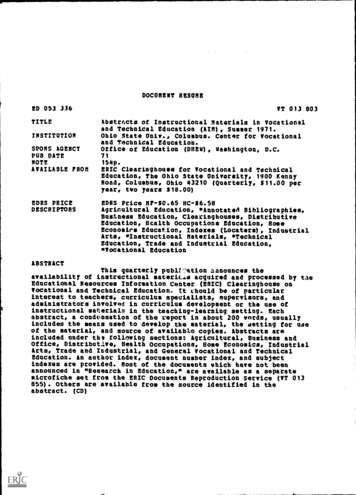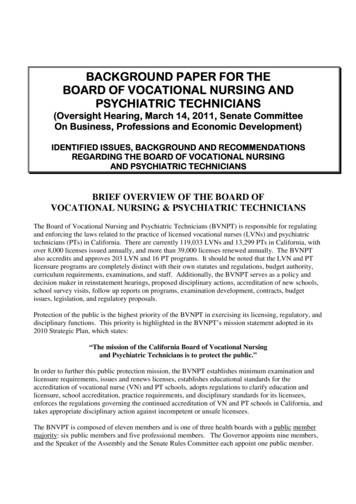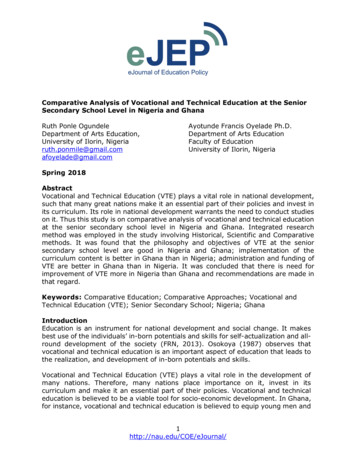
Transcription
Comparative Analysis of Vocational and Technical Education at the SeniorSecondary School Level in Nigeria and GhanaRuth Ponle OgundeleDepartment of Arts Education,University of Ilorin, otunde Francis Oyelade Ph.D.Department of Arts EducationFaculty of EducationUniversity of Ilorin, NigeriaSpring 2018AbstractVocational and Technical Education (VTE) plays a vital role in national development,such that many great nations make it an essential part of their policies and invest inits curriculum. Its role in national development warrants the need to conduct studieson it. Thus this study is on comparative analysis of vocational and technical educationat the senior secondary school level in Nigeria and Ghana. Integrated researchmethod was employed in the study involving Historical, Scientific and Comparativemethods. It was found that the philosophy and objectives of VTE at the seniorsecondary school level are good in Nigeria and Ghana; implementation of thecurriculum content is better in Ghana than in Nigeria; administration and funding ofVTE are better in Ghana than in Nigeria. It was concluded that there is need forimprovement of VTE more in Nigeria than Ghana and recommendations are made inthat regard.Keywords: Comparative Education; Comparative Approaches; Vocational andTechnical Education (VTE); Senior Secondary School; Nigeria; GhanaIntroductionEducation is an instrument for national development and social change. It makesbest use of the individuals’ in-born potentials and skills for self-actualization and allround development of the society (FRN, 2013). Osokoya (1987) observes thatvocational and technical education is an important aspect of education that leads tothe realization, and development of in-born potentials and skills.Vocational and Technical Education (VTE) plays a vital role in the development ofmany nations. Therefore, many nations place importance on it, invest in itscurriculum and make it an essential part of their policies. Vocational and technicaleducation is believed to be a viable tool for socio-economic development. In Ghana,for instance, vocational and technical education is believed to equip young men and1http://nau.edu/COE/eJournal/
women with the technical and professional skills needed for rapid socio-economicdevelopment of the country (Boateng, 2012).In Nigeria, there is similar belief in vocational and technical education (David, 2014;Adaralegbe, 1983). This study is interested in Comparative Analysis of Vocationaland Technical Education in Nigeria and Ghana. This is because the two countrieshave various things in common:i.ii.iii.iv.They both got independence from United Kingdom (Ghana in 1957, Nigeria in1960).They both had political governments that were interjected with military rules.They both suffered socio-economic crises as a result of educationalinadequacies and social disorientation (e.g. corrupt tendencies in politics,security and economy) (Buhari, 2015, Naijaloaded, 2016)Moreover, they are both struggling to get out of the socio-economic crisesusing education (particularly, Vocational and Technical Education) as a meansof getting out of the crises (Buhari, 2015; Boateng, 2012; FRN, 2013).The following table contains indices of performance of the two countries on variousissues that could influence the development of vocational and technical education atthe senior secondary school level in both countries.Table 1: Nigeria and Ghana on Global Innovation Index 2016VariablesIndexIndicatorsNigeriaGhana(%)(%)1. Political environment8.245.52. Political stability and absence ofviolence/terrorism10.559.63. Rule of law20.147.64. Ease of starting business77.183.75. Ease of paying taxes23.849.86. Expenditure on educationn/a56.67. Government expenditure on educationper pupil, secondaryn/a40.28. Pupil-teacher ratio, secondary23.874.79. Graduate in science & engineeringn/a32.410. ICT access28.245.111. ICT use18.126.412. Gross capital formation28.140.013. Market capitalization46.64.314. Employment in knowledge- intenseservicen/a14.415. High-tech imports9.817.216. Knowledge creation2.96.217. Growth rate of GDP per person engaged 74.557.72http://nau.edu/COE/eJournal/Graph view
18. Science and technical publications2.111.619. Creative good exports0.42.4Source: /interactiveComparision/Key: NigeriaGhanan/a not availableThough, the present secondary school system of education in Nigeria appears toadequately serve the needs of the nation, it does not really serve the needs of thenation. The theoretical aspect is adequate but the practical aspect is inadequate,and unemployment is rampant. Nigeria lacks adequate personnel to facilitate theimplementation of vocational and technical education curriculum. David (2014)observes that inadequate equipment and infrastructural facilities for teaching andlearning, low level of funding and poor remuneration of teachers are some of theproblems facing vocational and technical education in Nigeria.In Nigeria, Vocational and Technical Education has been largely pursued intheoretical form rather than in practical form for many years because of inadequatefacilities, inadequate administration and supervision and political challenges(Adaralegbe, 1983; Buhari, 2015). However, the National Policy on Vocational andTechnical Education appears to be good in terms of philosophy and objectives,curriculum content, and administration and funding (FRN, 2013).In Ghana, Vocational and Technical Education has been considerably more practicalthan theoretical. There have been consistent efforts to pursue Vocational andTechnical Education in more practical forms than theoretical forms over the years(Boateng, 2012 & Adogpa, 2015). The tendencies are therefore that there are moreemphasis on necessary infrastructures like electricity and water, curriculum contentsand administration.The results in terms of students’ attitude and general vocational and technicaldisposition in the society are better. This might inform better technologicaltendencies in Ghana than in Nigeria. But since the two countries have similarhistorical background it would be proper to have a comparative analysis of theVocational and Technical Education in both countries to be sure of the tendencies ofthe VTE in the countries and thereby make realistic recommendations foreducational and societal development in both countries. This is the focus of thisstudy.Thus the general aim of this research is to examine the following: the similaritiesand differences in the philosophy and objectives of Vocational and TechnicalEducation (VTE) at the senior secondary school level in Nigeria and Ghana; thesimilarities and differences in the curriculum content of VTE at the senior secondaryschool level in Nigeria and Ghana; the similarities and differences in theadministration and funding of VTE at the senior secondary school level in Nigeriaand Ghana.Research Questions3http://nau.edu/COE/eJournal/
In the light of the general aim of the study, the research questions for the study areas follows:A. What are the similarities and differences in the philosophy and objectives ofvocational and technical education at the senior secondary school level inNigeria and Ghana?B. What are the similarities and differences in the curriculum content of VTE atthe senior secondary school level in Nigeria and Ghana?C. What are the similarities and differences in the administration and fundingof VTE at the senior secondary school level in Nigeria and Ghana?Research MethodThe research method employed in this study involves integrated method of research,featuring historical, scientific and comparative methods of research.A researcher-designed questionnaire and an interview schedule were used to elicitinformation from 151 respondents drawn from the Federal Ministry of Education,Abuja, Nigeria; Ministry of Education, Accra, Ghana; National Business and TechnicalEducation Board (NABTEB) Secretariat, Benin, Nigeria; Council for TechnicalVocational Education and Training (COTVET), Accra, Ghana; and eight (8) Technicalcolleges (four from Nigeria and four from Ghana).The questionnaire had reliability index of 0.73. Quantitative and qualitative analyseswere employed to analyse the data collected. These include the percentage andcontent analyses.Data Analysis and Presentation of ResultsThe three research questions stated earlier would now be presented for the purposeof data analysis and discussion.Research Question 1: What are the similarities and differences in the philosophyand objectives of vocational and technical education at the senior secondary schoollevel in Nigeria and Ghana?Philosophy and objectives of Vocational and Technical Education involve thinkingabout education that would lead to production of graduates who should be able tosecure jobs that are well-paid for and initiate employments in various technical,technological, and practical vocations that could help personal, social and societaldevelopments (Boateng, 2012; Olabode, Badmus; Ademola, 2012).In this study, research questions are raised to elicit information about themanifestation of the implementation of philosophy and objectives of VTE at the seniorsecondary school level in Nigeria and Ghana. The following table, figure, anddiscussion contain analysis of opinions of respondents in both countries.4http://nau.edu/COE/eJournal/
Table 2: Percentage Analysis of Opinions on Items on Philosophy andObjectives*Note: Percentage of respondents in each country is in parenthesesCodeVariablesCountryTo aTo aTo aNot tent(%)A1VTE at theNigeria34(44.7) 23(30.3) 12(15.8)7(9.2)seniorsecondaryGhana38(50.7) illstoindividuals forvocationaldevelopmentA2VTE at theNigeria24(31.6) 26(34.2) 20(26.3)6(7.9)seniorsecondaryGhana9(12.0)35(46.7) lopmentA3VTE at theNigeria28(36.8) 21.3) 44(58.7) 10(13.3)school levelprovidespractical andtechnologicalattitudeA4VTE at theNigeria30(39.5)25(32.9) 17(21.4)4(5.3)seniorsecondaryGhana36(48.0)24(32.0) 10(13.3)5(6.7)schoollevelcontributes toeconomicdevelopmentA5VTE at theNigeria13(17.1) 31(40.8) (29.3)5(6.7)school levelprovidessociallifedevelopmentA6VTE at theNigeria10(13.2) 24(31.6) 28(36.8) 75(100)76(100)75(100)76(100)
A7secondaryschool levelprovidesagriculturaldevelopmentVTE at theseniorsecondaryschool levelcontributes 32.0%28.9%31.6%22.4%14.0%A1A2A310.7%A4A5A6A7Figure 1: Positive opinions on items on philosophy and objectives of VTE at thesenior secondary school level in Nigeria and Ghana.On Table 2 and Figure 1 above it can be seen that the philosophy and objectives ofVTE at the senior secondary school level in both countries manifest provision ofnecessary skills to individuals for vocational and technological development to a largeextent. However, there is manifestation of more practical attitude in vocational andtechnical education in Nigeria than in Ghana. On economic development, VTE at thesenior secondary school level contributes to economic development to a large extentin both countries. It promotes social life development to a large extent in Ghana butto a fairly large extent in Nigeria. Besides, VTE at the senior secondary school levelpromotes agricultural development more in Nigeria than in Ghana. Moreover, itcontributes to national development to a large extent in both countries.However in Ghana, Technical Institutes aim at training and cultivating practicalattitude and skills leading to the provision of artisans, craftsmen, technicians, andother middle-level personnel in commerce, agriculture, technology, science, andindustry (Adogpa, 2015). These trained artisans, craftsmen and technicians cometogether to form associations with government involvement for mutual benefit andnational development. Some of these associations exist in Nigeria as well, but withproductivity lower than that of Ghana. These associations can be more productivein Nigeria with similar government intervention.6http://nau.edu/COE/eJournal/
The centrality of vocational and technical education in economic development isnoteworthy. In line with this view Okolocha (2006) states that vocational andtechnical education is the bedrock of sustainable development of any nation.Vocational and technical education prepares individuals for productive living tocontribute effectively to the development of the society. As a result of its vital rolesin national development, many nations have given vocational and technicaleducation recognition towards national development. Thus, they invest in itscurriculum and make it an essential part of their policies (FRN, 2013). Nigeriatherefore needs to invest more in VTE for economic growth and nationaldevelopment.Research Question 2: What are the similarities and differences in the curriculumcontent of VTE at the senior secondary school level in Nigeria and Ghana?The choice of Vocational and Technical Education curriculum content is based on theroles that Technical Colleges or Institutions are expected to play in the society. Fromliterature review (e.g. Boateng, 2012; David, 2014) it can be seen that both countrieshave similar curriculum content of VTE at the senior secondary school level. Littledifferences exist in terms of Cosmetology and Upholstery that are included in Nigeria;Sculpture and Drumming and Dancing in Ghana. In this study, research questionsare raised to elicit information about the curriculum content of VTE at the seniorsecondary school level in Nigeria and Ghana. The following table, figure, anddiscussion contain analysis of opinions of respondents in both countries.Table 3: Percentage Analysis of Opinions on Items on Curriculum Content*Note: Percentage of respondents in each country is in parenthesesCode VariablesCountryTo aTo aTo aNot tent(%)B1VTE curriculumNigeria38(50.0)22(28.9) 11(14.5)5(6.7)at the seniorsecondaryGhana31(41.3)29(38.7) 10(13.3)5(6.7)school level isrelevant to theneed of thesociety.B2The curriculumNigeria34(44.7)24(31.6) 12(15.8)6(7.9)content of VTEat the school level ismoretheoreticalthan practical.B3ThereareNigeria5(6.6)11(14.5) 36(47.4) 24(31.6)adequate toolsandwellGhana9(12.0)33(44.0) )76(100)75(100)76(100)75(100)76(100)75(100)
TEcurriculum attheseniorsecondaryschool levelProductsofVTE at theseniorsecondaryschoollevelcontributeadequately tothe economicgrowth of GERIAGHANA39.5% 40.0%32.7%23.7%28.0%28.0%23.7%10.5%B1B2B3B4Figure 2: Positive opinions on items on curriculum of VTE at the senior secondaryschool level in Nigeria and Ghana.Based on the findings shown on Table 3 and Figure 2 above; at the senior secondaryschool level in both countries VTE curriculum is relevant to the need of the society toa large extent. Also, the curriculum content is more practical than theoretical in bothcountries though to a greater extent in Ghana than in Nigeria. The effort made bythe government in Ghana in the provision of adequate tools and workshops relevantto the implementation of VTE curriculum at the senior secondary school level is morethan that of Nigerian government. As a result, the products of VTE at the seniorsecondary school level in Ghana contribute more to economic growth of their countrythan their Nigerian counterparts.8http://nau.edu/COE/eJournal/
Research Question 3: What are the similarities and differences in theadministration and funding of VTE at the senior secondary school level in Nigeria andGhana?In Ghana, the Ministry of Education (MOE) has the overall responsibility for educationpolicy, planning, supervision and monitoring. Based on this, Ghana Education Service(GES) is the agency that is in charge of Basic and high school education, includingTechnical and Vocational Institutes (Republic of Ghana, 2000). However, Council forTechnical and Vocational Education and Training (COTVET) was established for thepurpose of formulating policies to improve the quality, relevance and perception oftechnical and vocational education and training across Ghana. In Nigeria as well, thesecondary level vocational and technical education is controlled and supervised bythe Ministry of Education. The National Board for Technical Education (NBTE)oversees polytechnics and monotechnics, while the Industrial Work ExperienceProgramme comes under the control of the Industrial Training Fund (FRN, 2013). Inboth countries, funding in terms of remuneration of teachers, provision of tools andequipment is the duty of the government. From literature review, it can be gatheredthat Nigeria and Ghana are facing similar problems in the administration and fundingof VTE (e.g. Boateng, 2012, Ukma, Ochedikwu, & Deke, 2013) although Ghanaappears to be more focused than Nigeria.In an open ended question, some of the respondents in Nigeria suggested that thereshould be regular supervision and good record keeping. In the aspect of funding theysuggested that government should fund VTE programmes adequately foreffectiveness. In Ghana, some of the respondents suggested that government shouldpay more attention to vocational and technical education; government’s allocation toVTE should be increased for effectiveness. They added that private bodies should alsobe involved.Table 4: Percentage Analysis of Opinions on Items on Administration andFunding*Note: Percentage of respondents in each country is in parenthesesCode VariablesCountryTo aTo aTo aNot at )(%)extent(%)C1TheNigeria5(6.6)13(17.1) )16(21.3) yschoolisadequate9http://nau.edu/COE/eJournal/
C2C3C4VTE at theseniorsecondaryschool level iswell-fundedSupervisionof VTE at theseniorsecondaryschool level iseffective.Thereisadequatetrainingonthe job forVTE teachersat the seniorsecondaryschool %5.9%C2C311.2% 13.3%C4Figure 3: Positive opinions on items on administration and funding of VTE at thesenior secondary school level in Nigeria and Ghana.From Table 4 and Figure 3 above it can be seen that remuneration of VTE teachersat the senior secondary school level is adequate to a little extent in both countries.In both countries, VTE at the senior secondary school level is well-funded to a littleextent; although to a better extent in Ghana than in Nigeria. Supervision of VTE atthe senior secondary school level is more effective in Ghana than in Nigeria. In bothcountries, there is adequate training on the job for VTE teachers at the seniorsecondary school level to a little extent.Agbulu and Olaitan (2002) in their view of administration of VTE in Nigeria had earlierindicated that the administration and management of vocational and technicaleducation at the senior secondary school level in Nigeria has been very turbulent asthere is no separate regulatory body for proper control and supervision at the senior10http://nau.edu/COE/eJournal/
secondary school level. Vocational and technical education as an aspect of educationthough very productive is expensive. In both countries, poor funding has made itdifficult for vocational and technical education to flourish.ConclusionIn conclusion, VTE at the senior secondary school level is better in Ghana than inNigeria in terms of curriculum content, administration and funding; while in terms ofphilosophy and objectives, VTE at the senior secondary school level performs well inboth countries. Thus although, there is need for improvement in the development ofVTE at the senior secondary school level in both countries, there is need for moreimprovement in Nigeria.a.b.c.d.Lessons derived from GhanaIn Ghana, VTE curriculum content at the senior secondary school level contributesmore to economic growth.The government of Ghana provides adequate tools and well equipped workshopsrelevant for implementation of VTE curriculum at the senior secondary school levelto fairly large extent.Supervision of VTE at the senior secondary school level is effective to a fairly largeextent in Ghana.There is a separate regulatory body for VTE at the senior secondary school levelin Ghana.Lessons derived from Nigeriaa. The philosophy and objectives of VTE at the senior secondary school levelencourage practical and technological attitude in Nigeria.b. Also, the philosophy and objectives of VTE at the senior secondary school levelencourage agricultural development in Nigeria.RecommendationsBased on the findings and conclusion of the study, the following recommendationsare made: Policy makers in both countries should ensure that the philosophy andobjectives of vocational and technical education are realistically pursued forvocational and technological development, development of social life and economicdevelopment in both countries.In Nigeria, the government and the people should pursue greater implementation ofVTE curriculum at the senior secondary school level. This could be done byencouraging provision of adequate number of well-equipped workshops in thesecondary schools and technical colleges. Moreover, adequate number of well-trainedteachers should be emphasised. In both countries, government should pay moreattention to the remuneration of VTE teachers and funding of the secondary schoolsand technical colleges.Finally, the recommendations stated above could be useful for developing nationsthat may be in the same situation as the ones in this study.References11http://nau.edu/COE/eJournal/
Adaralegbe, A. (1983). A Philosophy for Nigerian Education. Ibadan: HeinemannBooks (Nigeria) Ltd.Adogpa, J. (2015). Technical-vocational education and language policy in Ghana.International Journal of Educational Administrations and Policy Studies, 7(1),p1-5.Agbulu, O. N. & Olaitan, S.O. (2002). Comparative vocational technical educationsystems in U.S.A., Great Britain and Japan: lesson for Nigeria. Makurdi:Aboki Publishers.Boateng, C. (2012). Restructuring vocational and technical education in Ghana: Therole of leadership development. International Journal of Humanities andSocial Science, 2(4), 108-114Buhari, M. (2015, December 23). “Budget of Change” for 2016. The Nation.David, S. (2014). An overview of vocational and technical education in nigeriaunder secondary school education system.International Journal of TechnologyEnhancements and Emerging Engineering Research, 2(6), 199-122.Federal Republic of Nigeria. (2004). National policy on education. Lagos: NigerianEducation Research and Development Council Press.Federal Republic of Nigeria. (2013). National policy on education. Abuja: NigerianEducation Research and Development Council Press.Naijaloaded. (2016, May 29). Excerpts of President Buhari’s democracy speech.Retrieved from: locha, C. C. (2006) Vocational technical education in Nigeria: Challenges andthe way forward. Nnamdi Azikiwe University Orient Journal of Education,2(1), 180-189Olabode, B. O. Badmus, A.S. & Ademola, E.A. (2012, September 8).The roles oftechnical and vocational education in the Nigerian development agenda(vision 2020). Social Science Electronic Publishing. Retrieved fromhttp://ssrn.com/abstract 2143690.Osokoya, I.O. (1987). 6-3-3-4 Education in Nigeria: History, strategies, issues andproblems. Lagos: Bisinaike Publishers.Republic of Ghana (2000). Educational content and learning strategies for livingtogether in the twenty-first century: Problems and solutions. National ReportAccra: GESUkma, S., Ochedikwu, J.O. & Deke, G.N. (2013). Revamping vocational andtechnical education in Nigeria for sustainable development. MediterraneanJournal of Social Sciences MCSER Publishing, Rome-Italy, 4(12), 55-60.12http://nau.edu/COE/eJournal/
women with the technical and professional skills needed for rapid socio-economic development of the country (Boateng, 2012). In Nigeria, there is similar belief in vocational and technical education (David, 2014; Adaralegbe, 1983). This study is interested in Comparative Analysis of Vocational and Technical Education in Nigeria and Ghana.
